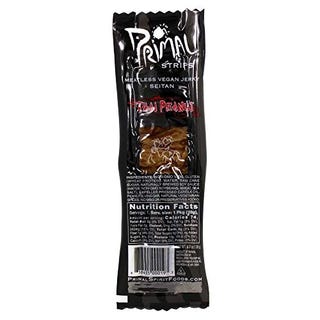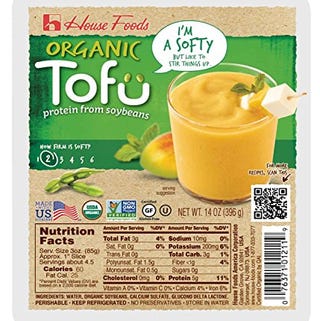Vegan Alternative to Beef and Sausage
There are so many reasons to go plant-based. It's good for the environment, it reduces animal cruelty, it lowers your cholesterol, and you might generally feel much better. But let's be real: Giving up your favorite foods can be a real challenge, especially if you're used to chowing down on chicken and burgers on the regular.
But vegan and vegetarian meat alternatives have come a long way from sad veggie burgers or tofu cubes. Now, there are never-ending options available, from savory tempeh bacon to vegan burgers that look (almost eerily) like beef.
"Meat substitutes can be very helpful for those who are transitioning to a plant-based, vegetarian diet, and usually rely heavily on meat for their meals," explains Krystal George, MPH, RDN. These plant-based subs help satisfy meat cravings without really chowing down on the real thing.
George cautions that while there are many options available on the market, you want to be careful of the ones you're choosing, since many meat substitutes are often made with dyes, lots of sodium, and artificial binders (what holds food together, like when you use eggs to make something sticky enough to coat it in flour or bread crumbs).
George recommends sticking to more natural, organic options when you can, like lentils, tofu, or tempeh. "I think the perfect balance is to focus more on whole food, plant-based protein options—such as beans and legumes— and allow some flexibility to consume meat-like substitutes when you're wanting something different, or quick to prepare," she adds. "Some companies are really doing all they can to make them as healthy as possible."
This content is imported from {embed-name}. You may be able to find the same content in another format, or you may be able to find more information, at their web site.
Overwhelmed by the options? Don't stress. These dietician-approved options will taste so good, you won't even miss the meat.
1. Pea Protein
Why it's great: It's tough to mimic the texture and mouthfeel of ground beef, but pea protein isolate or textured pea protein nails it pretty well. According to Desiree Nielsen, R.D., some brands use beets as food coloring to give pea protein isolate that medium-rare ground beef look. Nielsen also notes it's gluten free, soy free, GMO-free, and contains tons of protein.
Keep in mind: While vegan, it can be loaded with coloring and textural additives. "Eating hyper-processed meat substitutes like this once or twice a week as a treat would be fine within a healthy diet, but I wouldn't make them a mainstay over simpler options like beans and high-protein veggies," she says.
2. Tempeh
Why it's great: "One of my favorite vegetarian meat options," says Amy Shapiro, R.D., founder of Real Nutrition. Not to be confused with tofu, tempeh is made of fermented soybeans. The result is a thick, loaf-like substance that tastes delicious sliced in sandwiches, cubed in salads, or sizzled and smoked on a pan in place of bacon strips.
It's a complete protein, and the fact that it's fermented helps maintain healthy gut bacteria. It's high in calcium, which promotes strong bones, and contains antioxidants, which helps ward off a variety of diseases. Tempeh is also rich in isoflavones, which may help fight certain cancers, Shapiro says, while its high manganese levels might help regulate blood sugar and, again, promote bone health.
Keep in mind: Tempeh is extremely high in fiber, so introduce it into your diet slowly to avoid bloating. Since store-bought versions can be high in sodium and other additives, you can also buy your own tempeh starter kit for a healthier DIY version.
3. Seitan
Why it's great: This meat alternative made from wheat gluten acts as the star of many Buddha bowls—and thanks to its dense texture, it's eerily similar to duck, but works well sliced in sandwiches or topped on pizza. If you have a soy allergy or prefer to avoid it for other reasons, seitan isn't soy-based, so this is a safe bet. Shapiro adds that it's high in protein, which can help promote weight loss and muscle maintenance.
Keep in mind: Since it's made of wheat proteins, people with gluten sensitivities, intolerances, allergies, or Celiac disease should stay away. You also have to be careful about what you're buying. "Quick store-bought varieties are often full of preservatives, seasonings, and additives like soy sauce, sodium, and stabilizers to help it taste better," Shapiro says.
Unlike other meat alternatives, seitan is not considered a complete protein (one that contains all nine amino acids), so Shapiro recommends pairing it with other sources of plant-based protein like beans to balance it out.
4. Jackfruit
Why it's great: Jackfruit mimics the texture of pulled pork. The India-native fruit has a slightly sweet flavor, but if you braise it in the right savory sauces, you'll hardly be able to tell the difference. Shapiro says it's high in magnesium, fiber, B6, and antioxidants, while also being fairly low-carb in nature. The fiber content also helps with bowel regularity, weight loss, and cholesterol levels, she adds.
Keep in mind: It's not as high in protein as other meat alternatives, according to Shapiro, so pair it with other sources of plant-based protein like ancient grains and legumes for a complete, balanced meal.
5. Tofu
Why it's great: Tofu is made from congealed soy milk, Shapiro says. It's the chameleon of vegan meat substitutes, picking up virtually any flavor. Soy from tofu is a complete protein since it contains all of nine essential amino acids, which is a rarity in plant-based foods, Shapiro says. It's also high in minerals like iron and calcium, which are particularly crucial for vegan diets. Tofu is often fortified with vitamin B12, which is not bioavailable in plant-based foods.
Keep in mind: A few servings of tofu per day is totally cool, but don't overdo it on this stuff. Though the research is mixed, some studies have linked eating soy to hormone-influenced conditions, like thyroid issues and breast cancer. Unless you're having excessive amounts of tofu every day, it's probably not something to worry about. But still, if you're looking to eat tofu, Shapiro recommends going organic, and fermented (for some good gut bacteria) if possible.
6. Lentils
Why it's great: "Lentils are natural foods, rich in fiber, protein, and potassium," says George. Lentils are also pretty much the most unprocessed forms of plant protein you can find. Limiting processed foods is helpful so that you can avoid excess sugar or sodium.
Keep in mind: If you're following a low-carb diet, lentils may not be for you. "While they do have slow-releasing energy due to the amount of fiber in them, half a cup of lentils can have as much as 20g of carbs, making it unsuitable for those with more restrictive diets," says George.
7. Black Beans
Why it's great: Like lentils, black beans are unprocessed and very high in plant protein. "This in addition to their carbs, fiber, and antioxidants make black beans nutritional powerhouses," says George. Even though they don't have all the essential amino acids that make up a complete protein, a cup of black beans can have as much as 15 grams of protein and fiber.
Keep in mind: Many black beans come in tins filled with saltwater, which increases their sodium content quite substantially, warns George. It's better to stick with organic options that are in tins containing unsalted water. To find these, look for cans with labels that say, "No salt added," as those usually contain lower amounts of sodium.
8. Chickpeas
Why it's great: Did you know that if you combine chickpeas and brown rice, you get a complete protein because you'll be getting all nine amino acids? Sounds like a good deal. But even on their own chickpeas are star ingredients. A cup of garbanzos has about 35 grams of fiber, 39 grams of protein, making them a satiating option for any meal.
Keep in mind: The high carb and fiber content can lead to gas and other gastrointestinal issues in people with sensitive guts, as a lot of the sugars found in chickpeas are indigestible. If this is you, it's probably better to skip chickpeas and go with other protein options, like tofu and tempeh, instead.
9. Plant-Based Sausages
Why it's great: "I think it's cool that companies are making more mock meats and isolates to decrease meat consumption," says George. Mock sausages are essentially made mostly with pea protein so they're usually bursting with protein (more than 20 grams), and they're an easy way to satisfy your cravings and still get the texture of sausage when you're transitioning to a plant-based diet.
Keep in mind: Since these are heavily processed most of the time, George recommends only consuming them sparingly and not making them a huge part of your daily diet. She also suggests looking for items with lower sodium content and higher protein, since that'll help you stay satisfied without that icky bloated feeling you get after.
10. Plant-Based Chicken
Why it's great: "It really depends on the brand, but most plant-based chickens are made with soy or pea protein, making them very high in protein," says George. "They really mimic the taste of chicken incredibly well, so they're great for people who are transitioning and want a chicken-like feel." That's for you, all you chicken nugget lovers.
Keep in mind: They can be great sources of fiber and have less saturated fat than ground beef might, but they also can have a lot of sodium and binders that will make them hard on sensitive stomachs. "These foods are processed at the end of the day, so I wouldn't recommend them on a daily basis," says George.
11. Soyrizo
Why it's great: A vegan option for those who love flavorful Mexican chorizo, soyrizo is made of – you guessed it — soy. It has a meaty texture that most people who are missing meat will enjoy, and is super versatile: Think stuffing it into veggies, tacos, and so much more.
Keep in mind: Most soyrizos are heavily processed and have a ton of added flavoring, which means they are very high in sodium. In addition, many options have xanthan gum and colorings that can lead to issues like upset stomach and make them, well, not that great for you.
12. Vegetarian Deli Slices
Why it's great: "Many vegan and vegetarian deli slices are now made with lentils, which means they're much more natural, while still being high in protein," says George. "They're great to add into sandwiches for a snack which is low-effort, yet still pretty nutritious." Noted.
Keep in mind: "Not all slices are created equal, and I would watch out for the ones with added flavor," says George. Those with added flavoring have more artificial ingredients and sodium, which can lead to bloating and gas, explains George.
This content is created and maintained by a third party, and imported onto this page to help users provide their email addresses. You may be able to find more information about this and similar content at piano.io
Source: https://www.womenshealthmag.com/food/a19914260/best-meat-substitutes/



































